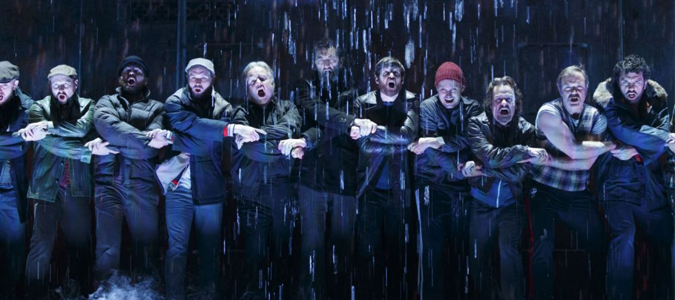

The Last Ship
Opening Night: October 26, 2014
Closing: January 24, 2015
Theater: Neil Simon Theatre
Inspired by Sting’s own childhood, The Last Ship is set in an English seafaring town that operates around the local shipyard and follows Gideon Fletcher, a man who left home to see the world and returns fourteen years later to find that the future of the shipyard is in danger. The shipyard’s workers decide to take their fate into their own hands and build a towering representation of the shared dream that has defined their existence.
BUY TICKETSREAD THE REVIEWS:
October 26, 2014
Hard times, blighted lives and the bleak humor that occasionally lifts the fog: The universe of The Last Ship, the new musical with a score by Sting about a shipbuilding town in decline, lies at some distance from its peppier neighbors on Broadway, where megaphoned uplift and easy escapism tend to thrive. For that reason alone, it’s hard not to root for this ambitious, earnest musical, which opened on Sunday night at the Neil Simon Theater. Rich in atmosphere — I half expected to see sea gulls reeling in the rafters — and buoyed by a seductive score that ranks among the best composed by a rock or pop figure for Broadway, the musical explores with grit and compassion the lives of the town’s disenfranchised citizens, left behind as the industry that gave them their livelihood set sail for foreign lands. But along with its accomplishments, which include a host of vital performances from its ample cast under the direction of Joe Mantello, The Last Ship also has its share of nagging flaws. The book, by John Logan (Red) and Brian Yorkey (Next to Normal), and inspired in part by Sting’s own upbringing in the northeast England town Wallsend, where the show is set, is unfocused and diffuse. It’s hamstrung by a division between a David versus Goliath story — of the little folk fighting against the faceless forces of the global economy — and a romantic love triangle.
READ THE REVIEWOctober 26, 2014
He may not appear onstage, but there’s no mistaking the voice of Sting in both wistful balladeer and rousing reveler modes in his stirring score for The Last Ship. Set against the demise of the shipyards in the composer’s hometown of Wallsend in North East England, this melancholy musical is without doubt a heartfelt, intensely personal project. It’s performed with vigorous commitment by an accomplished cast, robustly staged by Joe Mantello, and designed by David Zinn with a harsh beauty that seems salvaged out of the rusted hull of a once-proud sea vessel. Sadly, it’s also a bit of a yawn. For anyone who cares about the endangered species of the original Broadway musical, that’s a regrettable shortcoming, particularly when so much love and artistry have been poured into the show. There’s genuine feeling in the songs’ exploration of the conflicted bonds between fathers and sons, and the crippling losses of men robbed of their work, thereby denied their dignity and pride.
READ THE REVIEWOctober 26, 2014
The biggest selling point of The Last Ship is also its greatest stumbling block: multiple Grammy winner and Tantra enthusiast Sting, who provides the music and lyrics to his first-ever Broadway show. Fans hoping for the same pop sensibility that turned ”I’ll Be Watching You” and ”Desert Rose” into hits will be left wanting, as the bulk of Ship‘s songs lack the big melodic flourishes that stick around well after the curtain drops. Instead, the show trots out a series of dirges that lack the dynamism necessary to keep audiences fully engaged throughout the storytelling, which is sometimes hampered by a jumbled plot: After abandoning his working-class British coastal town 15 years ago, Gideon Fletcher (Michael Esper) returns to bury his father, re-kindle a relationship with his then-teenage girlfriend, Meg (Rachel Tucker), and get knee-deep in a labor battle over the closing of the local shipyard.
READ THE REVIEWOctober 26, 2014
You may be tempted upon leaving Sting’s Broadway musical The Last Ship to head straight to a pub to drain a pint and sing some sea shanties. Or maybe go weld something. Or do both. Such are the foot-stomping, testosterone-filled feelings that emerge from the Neil Simon Theatre, where a blast of British working class camaraderie among steel workers has docked during these times when we only construct things from Ikea. The Last Ship has some powerful performances, some outstanding songs, real heart and a creative team that uses every inch of the stage in thrilling ways. Perhaps there’s a bit of bloat and far too many sea references, but when it works, it does so brilliantly. The show is Sting’s semi-autobiographical story about a prodigal son who returns to his northern England shipbuilding town to reclaim the girl — and a son — he abandoned when he fled 15 years before. The shipyard, meanwhile, is closing and the workers are divided over the future. The show is about loss and letting go.
READ THE REVIEWOctober 26, 2014
To use shipbuilding as an analogy for crafting musicals, the songs are the hull—the most visible part of the thing, taking up the most space. But you won’t sail far without a strong, even keel, the beam around which the hull is constructed—the book, in other words. With The Last Ship, a fervent, rollicking and often glorious new musical scored by Sting and inspired by the town of his youth, the hull is magnificent, the keel has problems. When the muscular ensemble is tearing into Sting’s rueful ballads or jaunty barroom reels, you almost forget that the narrative stakes are exceedingly attenuated—unemployed shipwrights in a northern English town occupy a decommissioned factory to build one final vessel as an act of defiant solidarity. It’s a nice gesture, a symbolic blow for the working man priced out of his profession, but book writers John Logan and Brian Yorkey don’t quite establish what the lads hope to achieve—beyond a chance to drill their workplace shanty “We’ve Got Now’t Else” into our limbic system.
READ THE REVIEWOctober 26, 2014
Submerged beneath an often told prodigal-son story is a haunting, gorgeously executed and involving musical that marks the debut of a new Broadway composer—Sting. The British songwriter was inspired by his own childhood in writing The Last Ship, about a group of U.K. ship builders whose livelihoods are threatened by the changing global market, in a time that evokes the 1980s. The musical, directed by Joe Mantello and burnished by Steven Hoggett’s foot-stomping choreography—Hoggett’s Once is one of many recent musicals The Last Ship calls to mind—has just opened at the Neil Simon Theatre. Sting, as so many of us know, grew up Gordon Sumner in Newcastle’s seafaring Wallsend district. In The Last Ship, Gideon Fletcher (Michael Esper, of American Idiot) abandons that same community as a young man, rather than don the ship-builder’s boots his father has in waiting. When Gideon gets word from the town priest (a potty-mouthed Fred Applegate, getting all the best lines) that his dad is dying, he returns home, to find the Swan Hunter yard’s future in danger and his childhood love engaged to another man. It’s a familiar story that in lesser hands would quickly wobble under its weight.
READ THE REVIEW





















